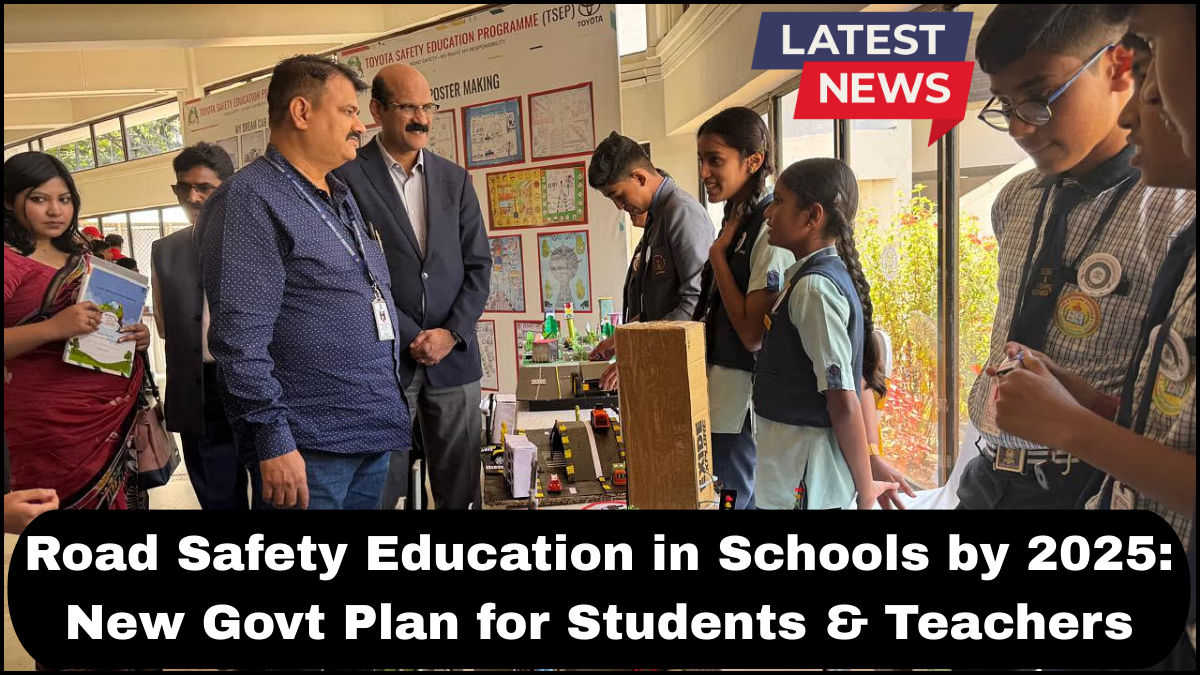India has long struggled with road safety issues, and the numbers are alarming. According to the Ministry of Road Transport and Highways, over 150,000 people lose their lives in road accidents every year. A significant proportion of these victims are under the age of 25. Recognizing this grim reality, the Indian government has announced a robust, nationwide initiative to introduce Road Safety Education in Indian Schools by 2025.
This new roadmap isn’t just an add-on to the curriculum; it’s a paradigm shift aimed at embedding road safety as a lifelong value among children, adolescents, and educators.

A Structured Curriculum for All Levels
By 2025, all educational boards across India—CBSE, ICSE, and state boards—will be mandated to integrate road safety modules into their existing syllabi. The modules will be age-appropriate:
- Primary Level (Classes 1-5): Basic traffic signals, pedestrian rules, and understanding safe zones.
- Middle Level (Classes 6-8): Bicycle safety, public transport etiquette, and awareness of accident-prone scenarios.
- Secondary and Higher Secondary (Classes 9-12): In-depth knowledge of traffic laws, responsible driving behavior, and accident first-response training.
The curriculum will combine theoretical understanding with practical sessions, including simulations, workshops, and real-life demonstrations. Schools will also conduct mock drills and quizzes to reinforce these lessons.
Teacher Training and Certification
A critical part of the initiative is empowering educators. Teachers will undergo specialized training in collaboration with traffic police departments, NGOs, and certified road safety organizations. A teacher must pass a certification program to be eligible to teach road safety topics, ensuring consistency and accuracy in delivery.
These training programs will not only cover traffic laws and safety protocols but also teaching methodologies suited for different age groups. Additionally, refresher courses every two years will help keep educators up to date with evolving road regulations.
Digital Integration and Gamification
In line with the Digital India initiative, road safety education will also leverage technology. Educational apps, interactive e-learning modules, and gamified quizzes will be introduced to make learning more engaging. Students will earn virtual badges and certificates, encouraging them to absorb the material with enthusiasm.
The use of augmented reality (AR) to simulate road-crossing scenarios or car dashboard controls will offer hands-on learning experiences without real-world risks. These digital tools are being developed in partnership with ed-tech companies and safety consultants.
Awareness Programs for Young Drivers
One of the key secondary goals is to launch awareness programs for young drivers, especially those in higher secondary classes and colleges. These will include:
- Workshops with driving school experts
- Talks from accident survivors
- Road safety pledges and awareness rallies
- Mandatory seminars before issuing learner’s licenses to teenagers
The Ministry of Education and Ministry of Road Transport will jointly implement these programs, ensuring that students understand both the legal and ethical responsibilities that come with operating a vehicle.
Collaboration with Parents and Communities
Road safety isn’t limited to school premises. Parents will be involved through awareness campaigns, school newsletters, and community events. Schools will encourage families to model safe road behavior at home, reinforcing what children learn in class.
PTAs will host discussions and workshops to create a community-driven ecosystem that upholds safety standards across the board.
Monitoring and Evaluation
To measure the effectiveness of the initiative, a national dashboard will track key performance indicators such as:
- Student performance in road safety assessments
- Number of trained and certified teachers
- Reduction in student-related road mishaps
An annual audit by district-level road safety officers will ensure accountability and help identify areas for improvement.
FAQs
Q1: When will Road Safety Education become mandatory in Indian schools?
By the academic year 2025, all Indian schools under various boards will be required to implement the road safety curriculum.
Q2: Will students be graded on road safety subjects?
Yes, assessments will be part of the curriculum, and students’ understanding will be evaluated through tests, practical activities, and projects.
Q3: How will this benefit young drivers?
Awareness programs for young drivers will instill responsible driving habits, educate them about road laws, and prepare them for safe vehicle use before they obtain their driving licenses.
Q4: What role will parents play in this initiative?
Parents will participate through workshops and awareness drives, helping reinforce safe practices beyond the classroom.
Q5: Is there any use of technology in this plan?
Yes, digital learning tools, AR simulations, and gamified apps will be integrated to make road safety education interactive and impactful.
click here to learn more